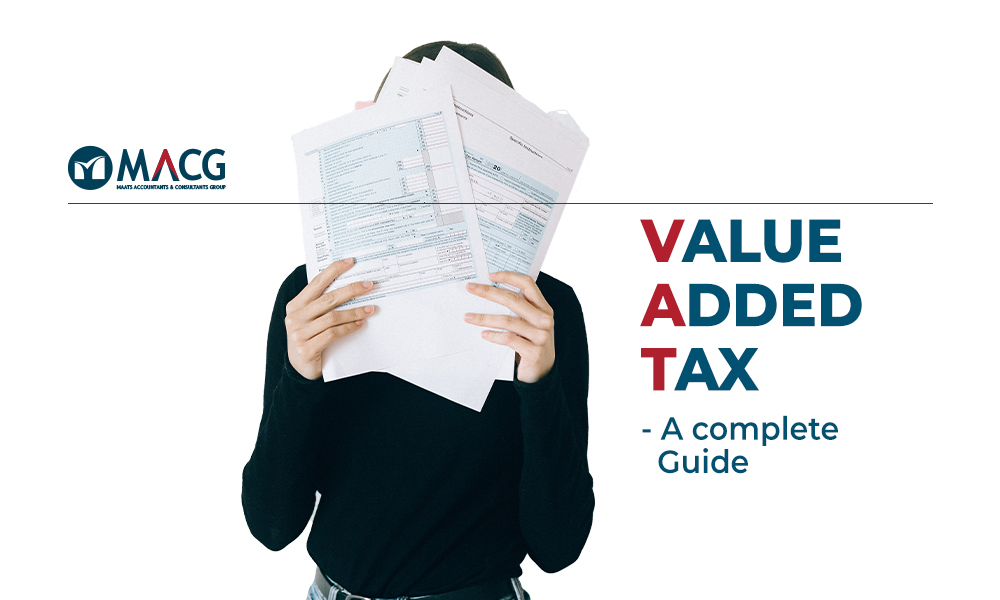What is Value Added Tax, or VAT?
Value-added tax is an indirect kind of consumption tax applied to most suppliers of goods and services that are bought and sold. VAT is assessed at every stage of the supply chain. On January 1, 2018, Dubai’s Federal Tax Authority implemented Value Added Tax (VAT), with a 5 percent VAT rate. High-quality public services are provided by using VAT as a revenue source.
Why the UAE has adopted VAT
Eliminating double taxation and the sales tax structure’s cascading effects was the driving force for the UAE’s implementation of VAT. The government of the United Arab Emirates provides its citizens with a number of public services that are funded by public funds. In order for the government to continue providing high-end services to its citizens and residents in the future, VAT will be imposed as a new revenue stream. Additionally, it can assist the government in relying on sources other than oil and other hydrocarbon revenue.
Requirements for VAT registration
Businesses that are tax-registered and run in the free zones and on the UAE mainland are subject to VAT. If a company’s annual taxable supply and imports total more than AED 375,000, they must register for VAT in the United Arab Emirates. Companies that import and supply more than AED 187,500 annually are exempt from required registration requirements but are free to choose to register for VAT in Dubai. If a business’s expenses are above this threshold, it may choose to voluntarily register. It is advised that you register your firm under VAT since these companies are eligible for input tax deductions.
VAT input and output
• The VAT that is included in the cost of qualifying products or services is known as input VAT.
• The VAT incorporated in the price of selling qualified products or services is known as the output VAT.
VAT-free supplies
Certain goods and services are exempt from VAT and are subject to zero-rate VAT charges. In general, zero-rated supplies are included in all UAE exports of products and services. In addition, zero-rated VAT applies to the construction of homes for human habitation, healthcare, and education services.
0% VAT will be applied to:
• Local supplies of certain educational and associated goods and services;
• Exports of goods and services beyond the United Arab Emirates
• Local providers of certain medical services
• Natural gas and crude oil supplies;
• Some investment-grade precious metals
VAT-exempt supplies
Notified financial services, residential buildings, bare land, and local passenger transport services are among the goods and services that are excluded from VAT.
Certain requirements must be met in order for the aforementioned goods and services to be deemed VAT-exempt.
VAT reimbursement
Following their VAT registration in Dubai, Al-registered firms are required to submit tax reports that include a summary of all the transactions and sales they made within a specific taxable period. Included must be the import, export, and exempt supply documentation as well as the VAT paid or collected during transactions. This document needs to be filed and supplied based on your invoicing. Every taxpayer in the United Arab Emirates is required to submit a VAT return at least once during each tax period.
VAT reimbursement
Following Dubai’s VAT registration, as previously mentioned, in order to receive a VAT refund in Dubai, every company must file a VAT return. You can file a VAT return after providing the VAT return with information about sales, purchases, output VAT, and input VAT paid during the tax period. The sum of the input VAT paid to the supplier on purchases and the output VAT received from sales is known as the output VAT.
The remaining amount will be VAT payable, which the taxpayer must pay to the FTA if the output VAT exceeds the input VAT. The remaining amount will be regarded as VAT refundable if the output VAT is less than the input VAT. The taxpayer may request a VAT refund in this situation.
Regular VAT returns must be filed by taxable enterprises, often within 28 days of the tax period’s conclusion.
UAE VAT audit
FTA performs VAT audits to look at the company’s financial records and determine whether or not it is in compliance with the tax laws. The FTA selects the companies that must participate in the VAT audit in Dubai; all registered firms are exempt from this requirement. These are a few situations that could lead to a VAT audit for the company.
Late VAT registration, inaccurate tax returns, a propensity to file VAT returns late, non-issuing of invoices and tax documentation, and tax evasion
The FTA will typically give the taxable company five working days’ notice of the VAT audit, but if doing so would interfere with the process, the FTA will not give notice.
During an audit, the taxable person is needed to provide supporting documentation and VAT return documents. In order to streamline the process, the pertinent staff members must also be present and accountable.
MAATS for Dubai VAT Registration
Professional tax consultants are necessary to help you navigate the VAT registration and other VAT services processes in Dubai. At MAATS, a knowledgeable staff is available to assist companies with VAT registration and all subsequent procedures. We offer excellent VAT consulting services in the United Arab Emirates at affordable prices. To assist your business in succeeding, we also provide services in corporate tax, company setup, audit and assurance, accounting, and bookkeeping.


